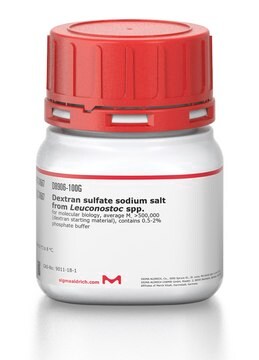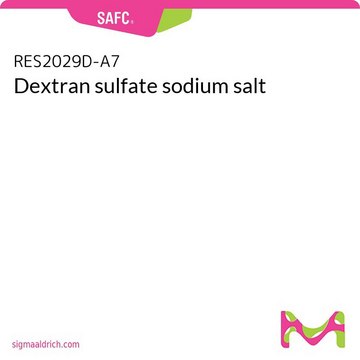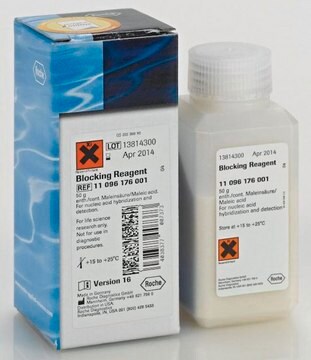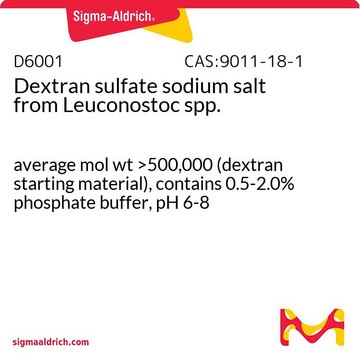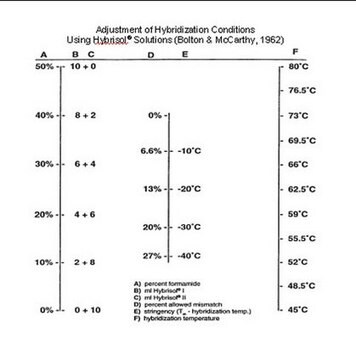67578
Dextran sulfate sodium salt
Synonim(y):
Sól sodowa siarczanu dekstranu
Zaloguj sięWyświetlanie cen organizacyjnych i kontraktowych
About This Item
Kod UNSPSC:
12352201
NACRES:
NA.25
Polecane produkty
Formularz
powder
strata
≤10% loss on drying
przydatny zakres pH
6.0-8.0 (10 g/L)
rozpuszczalność
H2O: 100 mg/mL, clear, colorless to faintly greenish-yellow
temp. przechowywania
room temp
Szukasz podobnych produktów? Odwiedź Przewodnik dotyczący porównywania produktów
Opis ogólny
Dextran is a polymer of anhydroglucose. It is composed of approximately 95% alpha-D-(166) linkages. The remaining (163) linkages account for the branching of dextran.
Zastosowanie
Dextran sulfate is routinely used for the selective precipitation of lipoproteins, probe hybridization membrane-immobilized DNA, the release of DNA from DNA-histone complexes, and the inhibition of RNA binding to ribosomes.
Dextran sulfate is used as a diluent in in situ hybridization experiments to increase hybridization of probes to target sequences in tissues.
Inne uwagi
To gain a comprehensive understanding of our extensive range of Dextrans for your research, we encourage you to visit our Carbohydrates Category page.
Ta strona może zawierać tekst przetłumaczony maszynowo.
Kod klasy składowania
11 - Combustible Solids
Klasa zagrożenia wodnego (WGK)
WGK 2
Temperatura zapłonu (°F)
Not applicable
Temperatura zapłonu (°C)
Not applicable
Wybierz jedną z najnowszych wersji:
Masz już ten produkt?
Dokumenty związane z niedawno zakupionymi produktami zostały zamieszczone w Bibliotece dokumentów.
Klienci oglądali również te produkty
The rate of nucleic acid annealing to cytological preparations is increased in the presence of dextran sulfate.
L L Lederman et al.
Analytical biochemistry, 117(1), 158-163 (1981-10-01)
Rodabe N Amaria et al.
Nature medicine, 24(11), 1649-1654 (2018-10-10)
Preclinical studies suggest that treatment with neoadjuvant immune checkpoint blockade is associated with enhanced survival and antigen-specific T cell responses compared with adjuvant treatment1; however, optimal regimens have not been defined. Here we report results from a randomized phase 2
Nadezhda V Petrova et al.
Cell cycle (Georgetown, Tex.), 15(3), 337-344 (2015-12-23)
Heat stress is one of the best-studied exogenous stress factors; however little is known about its delayed effects. Recently, we have shown that heat stress induces cellular senescence-like G2 arrest exclusively in early S-phase cells. The mechanism of this arrest
Sinah-Sophia Weiterer et al.
The EMBO journal, 39(1), e101533-e101533 (2019-11-09)
How cytokine-driven changes in chromatin topology are converted into gene regulatory circuits during inflammation still remains unclear. Here, we show that interleukin (IL)-1α induces acute and widespread changes in chromatin accessibility via the TAK1 kinase and NF-κB at regions that
Adél Sepsi et al.
Frontiers in plant science, 9, 1193-1193 (2018-08-30)
ImmunoFISH is a method combining immunolabelling (IL) with fluorescent in situ hybridisation (FISH) to simultaneously detect the nuclear distribution of proteins and specific DNA sequences within chromosomes. This approach is particularly important when analysing meiotic cell division where morphogenesis of
Nasz zespół naukowców ma doświadczenie we wszystkich obszarach badań, w tym w naukach przyrodniczych, materiałoznawstwie, syntezie chemicznej, chromatografii, analityce i wielu innych dziedzinach.
Skontaktuj się z zespołem ds. pomocy technicznej

